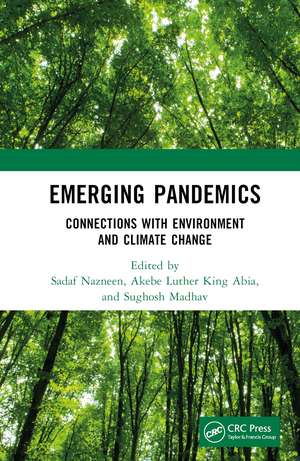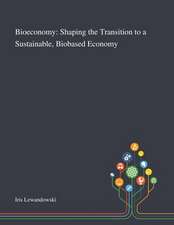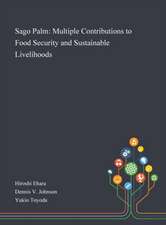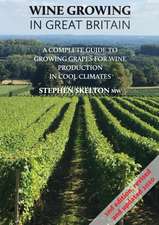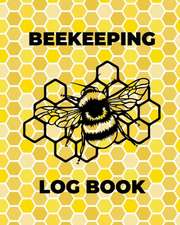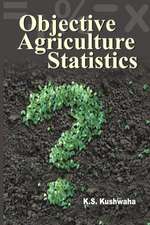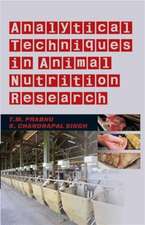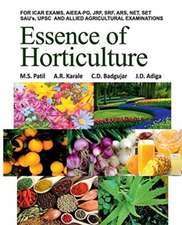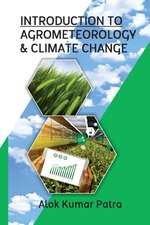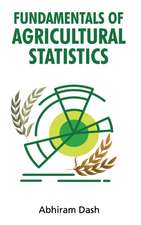Emerging Pandemics: Connections with Environment and Climate Change
Editat de Sadaf Nazneen, Akebe Luther King Abia, Sughosh Madhaven Limba Engleză Hardback – 4 iul 2023
The book covers some of the most essential elements of the diseases of pandemic nature and their relationship with the environment:
- Environment as a reservoir of human diseases
- Climate change: emerging driver of infectious diseases
- Occurrence and environmental dimensions of specific pandemics and epidemics
- Pandemics, environment, and globalisation: understanding the interlinkage in the context of COVID-19
- Climate change and zoonotic diseases: malaria, plague, dengue, encephalitis
- Tuberculosis: an old enemy of mankind and possible next pandemic
- Lassa fever in Nigeria: case fatality ratio, social consequences, and prevention
Preț: 694.52 lei
Preț vechi: 763.21 lei
-9% Nou
Puncte Express: 1042
Preț estimativ în valută:
132.89€ • 139.50$ • 110.31£
132.89€ • 139.50$ • 110.31£
Carte disponibilă
Livrare economică 20 martie-03 aprilie
Livrare express 05-11 martie pentru 29.22 lei
Preluare comenzi: 021 569.72.76
Specificații
ISBN-13: 9781032265346
ISBN-10: 1032265345
Pagini: 180
Ilustrații: 4 Tables, black and white; 16 Line drawings, black and white; 16 Illustrations, black and white
Dimensiuni: 152 x 229 x 16 mm
Greutate: 0.41 kg
Ediția:1
Editura: CRC Press
Colecția CRC Press
ISBN-10: 1032265345
Pagini: 180
Ilustrații: 4 Tables, black and white; 16 Line drawings, black and white; 16 Illustrations, black and white
Dimensiuni: 152 x 229 x 16 mm
Greutate: 0.41 kg
Ediția:1
Editura: CRC Press
Colecția CRC Press
Public țintă
Postgraduate and ProfessionalCuprins
Chapter 1 Occurrence and Environmental Dimensions of Specific Pandemics and Epidemics
Chapter 2 Climate Change: Emerging Driver of Infectious Diseases
Chapter 3 Economic Outcomes of Emerging Pandemics and its Implications on the Environment
Chapter 4 Tuberculosis: An old enemy of mankind and way to next pandemic
Chapter 5 Pandemics, Environment, and Globalisation: Understanding the Interlinkage in the Context of COVID-19
Chapter 6 Climate Change and Zoonotic Diseases: Malaria, Plague, Dengue, Encephalitis
Chapter 7 Environmental dimensions of Zika Virus triggered outbreak and its association with neurological complications like Guillain-Barrésyndrome and microcephaly
Chapter 8 Emerging contaminants in the environment and their linkage with COVID-19
Chapter 9 Lassa fever in Nigeria: case fatality ratio, social consequences and prevention
Chapter 10 Contribution of anthropogenic factors in the global advancement of Zika virus
Chapter 2 Climate Change: Emerging Driver of Infectious Diseases
Chapter 3 Economic Outcomes of Emerging Pandemics and its Implications on the Environment
Chapter 4 Tuberculosis: An old enemy of mankind and way to next pandemic
Chapter 5 Pandemics, Environment, and Globalisation: Understanding the Interlinkage in the Context of COVID-19
Chapter 6 Climate Change and Zoonotic Diseases: Malaria, Plague, Dengue, Encephalitis
Chapter 7 Environmental dimensions of Zika Virus triggered outbreak and its association with neurological complications like Guillain-Barrésyndrome and microcephaly
Chapter 8 Emerging contaminants in the environment and their linkage with COVID-19
Chapter 9 Lassa fever in Nigeria: case fatality ratio, social consequences and prevention
Chapter 10 Contribution of anthropogenic factors in the global advancement of Zika virus
Notă biografică
Dr. Sadaf Nazneen
Dr. Sadaf Nazneen is a PhD in Environmental Sciences from School of Environmental Sciences (SES), Jawaharlal Nehru University (JNU), New Delhi, India. She works on the interface of Environmental Chemistry and Biology. Dr. Nazneen has over 10 years of experience in various fields related to environmental pollution, nutrient cycling, carbon sequestration and climate change. Dr. Nazneen has a M.Sc degree in Biosciences and has sound knowledge of Biological and Environmental subjects. Currently, she is Dr D. S. Kothari Postdoctoral fellow at Department of Civil Engineering, Jamia Millia Islamia. Her area of research is Coastal Biogeochemistry and Ecology. For her PhD, she has worked on Chilika Lagoon, Asia's largest lagoon and a Ramsar Site. She has published several papers, book chapters and conference papers out of her PhD work. She is also actively involved in teaching Civil and Environmental Engineering students in her department.
Dr. Luther King Abia
Akebe Luther King Abia (King) is a Professor of Applied and Environmental Microbiologist at the University of KwaZulu-Natal. He is also the Founder and CEO of the Environmental Research Foundation (ERF). His research focuses on but is not limited to, antimicrobial resistance in the environment and how this relates to humans and animals through the One Health approach, using culture and molecular techniques, including metagenomics and whole-genome sequencing. He has over 20 years of experience as a microbiologist and is involved in many projects, including monitoring water and soil for human pathogens, especially antibiotic-resistant ones, under changing climates. He has published over 80 journal articles, six chapters, and one book. He has also graduated several PhD and MSc students.
Sughosh Madhav
Dr. Sughosh Madhav is presently working as Dr. D. S. Kothari Postdoctoral Fellow (DSKPDF) in the Department of Civil Engineering, Jamia Millia Islamia, New Delhi, India. He obtained his master's degree from the Department of Environmental Science, Banaras Hindu University, Varanasi, India. He earned his doctorate from Jawaharlal Nehru University, New Delhi. The area of his doctoral research is the environmental impact of industrial effluents on groundwater and soil quality. He has published various research papers and book chapters in the field of environmental geochemistry, water pollution, wastewater remediation, and climate change. He also edited seven books in Wiley, Springer, and Elsevier publications on various environmental issues.
Dr. Sadaf Nazneen is a PhD in Environmental Sciences from School of Environmental Sciences (SES), Jawaharlal Nehru University (JNU), New Delhi, India. She works on the interface of Environmental Chemistry and Biology. Dr. Nazneen has over 10 years of experience in various fields related to environmental pollution, nutrient cycling, carbon sequestration and climate change. Dr. Nazneen has a M.Sc degree in Biosciences and has sound knowledge of Biological and Environmental subjects. Currently, she is Dr D. S. Kothari Postdoctoral fellow at Department of Civil Engineering, Jamia Millia Islamia. Her area of research is Coastal Biogeochemistry and Ecology. For her PhD, she has worked on Chilika Lagoon, Asia's largest lagoon and a Ramsar Site. She has published several papers, book chapters and conference papers out of her PhD work. She is also actively involved in teaching Civil and Environmental Engineering students in her department.
Dr. Luther King Abia
Akebe Luther King Abia (King) is a Professor of Applied and Environmental Microbiologist at the University of KwaZulu-Natal. He is also the Founder and CEO of the Environmental Research Foundation (ERF). His research focuses on but is not limited to, antimicrobial resistance in the environment and how this relates to humans and animals through the One Health approach, using culture and molecular techniques, including metagenomics and whole-genome sequencing. He has over 20 years of experience as a microbiologist and is involved in many projects, including monitoring water and soil for human pathogens, especially antibiotic-resistant ones, under changing climates. He has published over 80 journal articles, six chapters, and one book. He has also graduated several PhD and MSc students.
Sughosh Madhav
Dr. Sughosh Madhav is presently working as Dr. D. S. Kothari Postdoctoral Fellow (DSKPDF) in the Department of Civil Engineering, Jamia Millia Islamia, New Delhi, India. He obtained his master's degree from the Department of Environmental Science, Banaras Hindu University, Varanasi, India. He earned his doctorate from Jawaharlal Nehru University, New Delhi. The area of his doctoral research is the environmental impact of industrial effluents on groundwater and soil quality. He has published various research papers and book chapters in the field of environmental geochemistry, water pollution, wastewater remediation, and climate change. He also edited seven books in Wiley, Springer, and Elsevier publications on various environmental issues.
Descriere
The book seeks to explore the documented history of pandemics and various epidemics which have the potential of turning into pandemics with the warming climate, pollution, and environmental destruction
